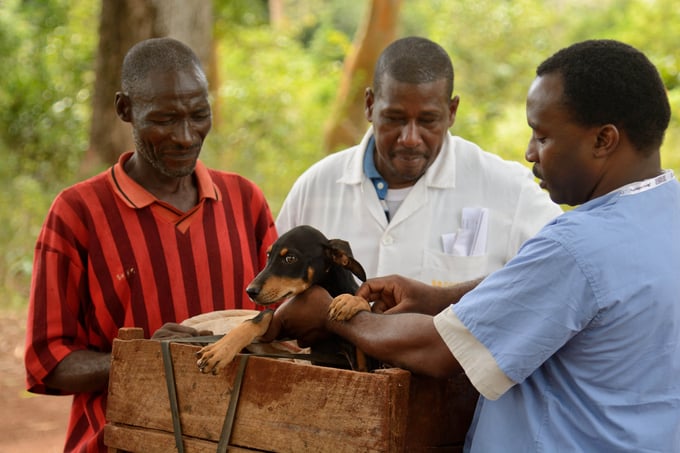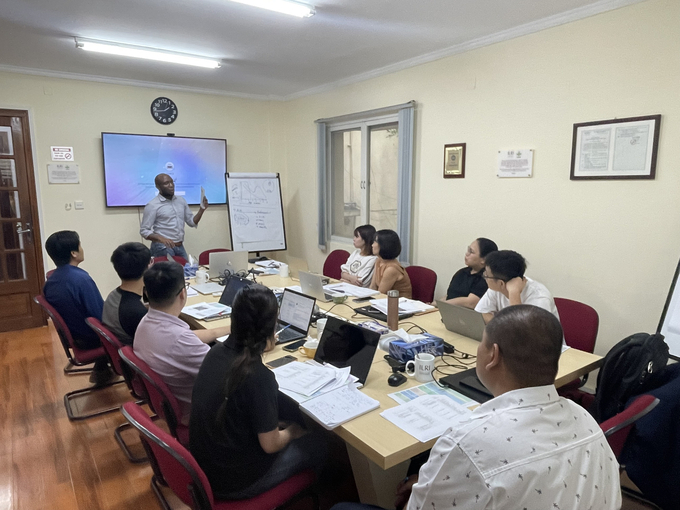November 23, 2025 | 13:46 GMT +7
November 23, 2025 | 13:46 GMT +7
Hotline: 0913.378.918
November 23, 2025 | 13:46 GMT +7
Hotline: 0913.378.918

Dr. Dishon Muloi, ILRI expert on epidemiology and antibiotic resistance. Photo: Tung Dinh.
Speaking at the One Health Scientific Conference under the theme “International One Health Practices and Lessons Learned for Vietnam,” Dr. Muloi highlighted the similarities between Kenya and Vietnam in confronting zoonotic diseases.
Recognizing that zoonoses, antimicrobial resistance, and food safety are complex issues that pose significant threats to global health security, socio-economic development, and food safety, Kenya established the One Health Platform – the Zoonosis Disease Unit (ZDU).
Founded in 2012 through a Memorandum of Understanding (MoU) between the Ministry of Health and the Department of Veterinary Services, ZDU includes medical and veterinary epidemiologists and other experts as needed. This initiative originated from the establishment of the National Influenza Taskforce (NIT) in response to the H5N1 threat in 2005, which later evolved into the Zoonosis Technical Working Group (ZTWG). The foundation of ZDU was formalized by 2011 with the signing of the MoU.
Dr. Muloi noted that Kenya’s One Health approach integrates agriculture, health, and environmental sectors, addressing the human, animal, and ecological interfaces.
Two permanent ZDU units, the Director of Veterinary Services (MALF) and the Director of Medical Services (MoH), lead these efforts. Through periodic missions to county levels, equivalent to Vietnam’s district level, the Zoonosis Technical Working Group (ZTWG) and One Health Committee implement preventive measures and rapid response protocols.

Kenyan working groups check the health of animals. Photo: WAP.
During special circumstances like the COVID-19 pandemic, ZDU mobilizes additional experts, including wildlife ecologists, zoologists, and representatives from the National Environment Management Authority (NEMA), to support ongoing efforts.
Recently, Kenya launched a One Health Strategic Plan for 2021-2025, focusing on strengthening One Health implementation at national and county levels, improving surveillance, response, and control of priority zoonotic diseases, and promoting applied research.
Kenya categorizes zoonotic diseases based on factors like severity in humans and animals, epidemic potential, disease burden, and socio-economic impacts.
This categorization includes anthrax, human trypanosomiasis, rabies, brucellosis, and Rift Valley Fever (RVF), which was first detected in 1912 and recurs every 5-15 years, often following flooding that increases vector populations.

Training session on antibiotic resistance data analysis at ILRI Vietnam office. Photo: ILRI.
To mitigate such outbreaks, Kenya has established a framework at the county level that includes disease surveillance coordinators, veterinary officers, and regional wildlife coordinators who collaborate on outbreak investigations, data sharing, and joint risk assessments.
“We aim to support research and data collection on zoonotic diseases across human, animal, and environmental interfaces to enable evidence-based decision-making,” Dr. Muloi emphasized.
In response to disease outbreaks, veterinary officers coordinate with health officials, conduct regional training, and develop specific response plans.
Despite the advancements at the county level, Dr. Muloi acknowledged challenges, including resource limitations, sector-specific financial and technical structures, decentralized governance, insufficient data on One Health drivers, and limited awareness among policymakers. He also noted the need for a stronger policy framework and comprehensive cost-benefit analyses of One Health.
“In Africa, diseases like malaria and HIV pose substantial challenges, often stretching One Health resources and diverting attention,” Dr. Muloi concluded.
Translated by Linh Linh

(VAN) Prof. Dr. Hoang Van Cuong, National Assembly Deputy of the 14th and 15th terms, shares recent pioneering policy decisions.

(VAN) Deputy Minister Tran Thanh Nam directed a comprehensive reform of the agricultural extension system, emphasizing professionalism and connecting farmers with the market.
/2025/11/22/3633-1-072521_760.jpg)
(VAN) The signing ceremony took place under the witness of Prime Minister Pham Minh Chinh and President of the Republic of South Africa Cyril Ramaphosa.

(VAN) Severe flooding in Khanh Hoa Province has caused catastrophic damage estimated at around USD 30 million, with the agriculture and irrigation sectors alone accounting for roughly USD 15.7 million in losses.

(VAN) Official Telegram No. 226/CD-TTg, issued on November 21, 2025, mandates enhanced management and utilization of national reserves to support flood response and relief efforts in the Central Region.

(VAN) The Politburo has demanded a high concentration of efforts on urgent relief tasks, ensuring absolute prevention of hunger, cold, and shortages of clean water or medicine among the population.

(VAN) Water resources during the 2025–2026 dry season in the Mekong River Basin basically meet domestic use and production needs, but localized shortages may still occur due to saltwater intrusion.